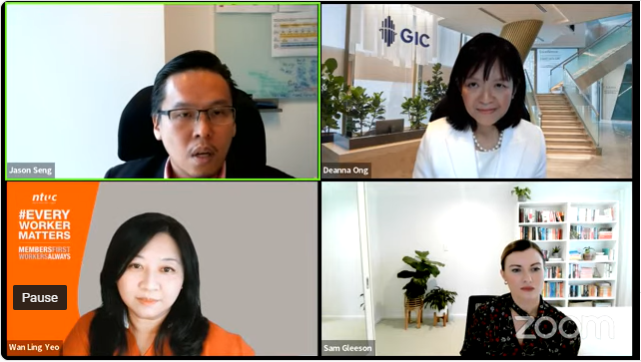Flexible working shaping the future of work in ASEAN

Flexible workplaces are here to stay, and more employers are seeing flexible work arrangements as a means to improve employee engagement and productivity, as well as boost talent retention and attraction, said Heng Swee Keat, Singapore’s Deputy Prime Minister (DPM) and Coordinating Minister for Economic Policies.
However, arriving at a hybrid work environment will not be straightforward, DPM Heng cautioned when giving his opening address at the ASEAN Future of Work Conference.
He explained, “Different workers have differing expectations for flexible work arrangements. Workplace settings and business needs also differ across companies – a one-size-fits-all approach will not work.”
“The shift towards greater flexible work arrangements will take time and some iteration. Many countries and companies are also feeling their way forward, and we can learn from one another.”
Calling for greater collaboration between countries and all stakeholders within each economy, DPM added that ASEAN is in a “good position” to contribute to, as well as benefit from, major shifts affecting the future of work.
And that set the stage for a successful ASEAN Future of Work (FOW) conference, which brought together speakers from regional governments, unions, and the private sector to discuss how to work together to balance stakeholders’ needs and interests in adapting to new business models and ways of working.
For flexible work to be successful, standards and best practices need to be developed to improve employee engagement and retention, and organisations need to create a culture that ensures all employees are treated fairly, said Yeo Wan Ling, Director, NTUC U Women and Family/USME.
Yeo joined Jason Seng, Partner, People Advisory Services, Ernst & Young Advisory; Samantha Gleeson, Group People Director, SafetyCulture; and Deanna Ong, Chief People Officer, GIC in a panel discussion that discussed the challenges and best practices to balance the needs of businesses and their workers under flexible work models.
The panel also highlighted the importance of putting digital enablers in place, and how flexibility is about creating autonomy for employees to decide how work gets done.
Part of the line-up of exciting virtual events on Day 3 of HR Tech Festival Asia 2022, ASEAN FOW also discussed topics such as the future of AI in HR and strengthening labour protections for platform workers.
Away from the ASEAN FOW conference track, the focus inadvertently turned to the most important asset any organisation can have – their people.
With 76% of organisations globally experiencing an increase in attrition over the past year, the emphasis is on flexibility in the race to compete for talent in 2022, revealed Dr Katheryn Brekken, Senior Research Analyst, Institute for Corporate Productivity (i4cp).
Drawing on findings from i4cp’s Talent Imperative survey, she highlighted that high-performing organisations are those that provide employees with considerable choice regarding where they work, whether in the office, remotely, or on a hybrid basis.
Dr Brekken added, “i4cp data shows a statistically significant relationship between flexibility and attrition, with more flexible organisations having significantly less attrition over the past 12 months.”
Another trend i4cp sees developing is more organisations offering employees the option to choose when they work as more attention continues to be paid to DE&I, mental wellbeing, and work-life balance.
Rather than take the time to investigate the true causes of attrition, many companies are jumping to well-intentioned quick fixes that fall flat, cautioned Gavin Morse, Senior People Scientist, Culture Amp.
Instead, organisations need to find opportunities to focus on how to evolve the employee experience, beginning with what Culture Amp calls the Great Onboarding. “By focusing on creating a great onboarding experience, you can help to maintain the high levels of engagement employees feel when they initially took on their role and you can help that carry on for longer across the employee journey,” said Morse.
Effective onboarding, he added, also has a very positive impact on overall job performance, allowing the organisation and their people to prepare for and embrace change, as well as identifying opportunities where other may only see challenges.
Employees with a strong sense of belonging are more engaged, productive, resilient, and satisfied, said Pesha Krishnan, Customer Success Manager, APAC, Achievers. “Belonging is also the outcome of an organisation’s commitment to create conditions for diversity and inclusion for all employees,” she added.
During her presentation, Pesha introduced the Achievers Workforce Institute’s (AWI) Belonging Model, which included the five belonging pillars of Welcomed, Known, Included, Supported, and Connected.
Organisations can use these five key pillars to optimise their recognition programmes. This can be achieved by regularly recognising employees in alignment with their own personal values, recognising behaviours that promote a diversity of input and perspective, recognising employees for working toward growth and development goals, and recognising actions that bring people together across business and demographic lines, Pesha explained.
To get employees to engage and participate in HR programmes, Georgie Duthy, Enterprise Customer Success Manager & Project Lead, Enboarder, recommended the company’s People Activation Model, which takes a human-centric approach to drive engagement and action.
Within this model, there are four key components of Engagement, Nudge, Ease, and Connection. Engagement can only be achieved when programmes are meaningful, properly personalised, and employees understand why they are important to them and the company.
Nudges, or bite-sized and relevant communications, delivered at the right time with the right information, trigger a cognitive response nudging a person towards the desired outcome.
Describing the two other components, Duthy said, “If we want employee participation in our programmes, we need to make their experience as easy and frictionless as possible. Your people will also be motivated to do their best work when they feel they belong and are serving a greater mission.”
With Gen Z employees (those born between 1997 and 2012) expected to account for 40% of the workforce by 2040, a new era consisting of a multi-generational workforce is beginning to be shaped.
The challenge for organisations, said Rachele Focardi, Future of Work Strategist and Founder of XYZ@Work, is to create the best possible environment for a vastly diverse group of employees across different generations. “How do you bring together different generations together at the workplace?” she asked.
Drawing on findings from the 2022 Post-Pandemic Workplace Study conducted by XYZ@Work, Focardi also highlighted how remote work has impacted team collaboration. Across all generations, 72% of employees found it “significantly more challenging” to maintain team collaboration while working remotely and identified good communication tools (53%) and flexible schedules (43%) as some of the most effective initiatives for fostering cultural bonds in remote teams.
READ: Addressing employee needs critical for sustained organisational growth
A statutory board under Singapore’s Ministry of Manpower, Workforce Singapore (WSG) oversees the transformation of Singapore’s local workforce and industry to meet ongoing economic challenges.
Joining HR Tech Festival Asia this year was Stephanie Sng, Manager, Creative & Professional Services Division, (WSG), who shared the numerous initiatives and programmes that WSG has introduced to help upport HR manpower development in Singapore.
These include the HR Tech Transformation Programme (HRTTP), which aims to support support enterprises in implementing HR technology through HR process re-engineering, redesigning of impacted HR jobs, and managing HR job transitions arising from the HR technology adoption.
The Career Conversion Programme (CCP) for human capital professionals, which will be launched next month, helps reskill existing HR professionals for more strategic roles, and support mid-career conversions to the HR profession.
HR Tech Festival Asia 2022 concludes on May 13 with HR Tech Marketplace, which is bringing together the biggest showcase of HR solutions and products from global, regional, and local solutions providers under one virtual roof.
Click here to register and learn how you can power up your HR teams for a successful year ahead!



